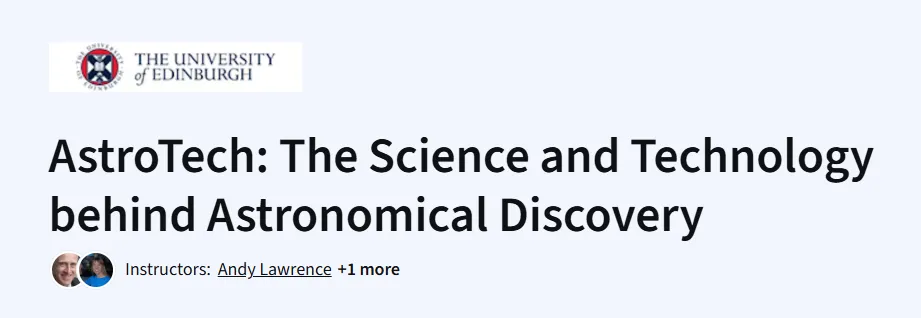What will you learn in AstroTech: The Science and Technology behind Astronomical Discovery Course
Explore key concepts in astronomy including the Big Bang, black holes, galaxies, and cosmic evolution.
Understand how astronomical discoveries are made using light and telescopes.
Gain insight into how space and time are measured in cosmology.
Develop critical thinking around scientific evidence and theory in astrophysics.
Program Overview
Module 1: Science and the Universe: A Brief Tour
⏱️ 1 week
Topics: Scale of the universe, scientific method, units of measurement.
Hands-on: Identify astronomical objects and interpret light spectra.
Module 2: Observing the Sky: Tools and Techniques
⏱️ 1 week
Topics: Telescopes, electromagnetic spectrum, observation strategies.
Hands-on: Explore virtual telescope simulations and observation logs.
Module 3: Radiation and Spectra
⏱️ 1 week
Topics: Nature of light, atoms, spectra, and astronomical data.
Hands-on: Analyzing stellar composition through spectrum data.
Module 4: Formation of the Solar System
⏱️ 1 week
Topics: Planet formation, early solar system, exoplanets.
Hands-on: Review real planetary data and simulations.
Module 5: Stars and Galaxies
⏱️ 1 week
Topics: Stellar evolution, neutron stars, black holes, Milky Way.
Hands-on: Interactive simulations of stellar birth and death.
Module 6: Cosmology and the Future of Space Exploration
⏱️ 1 week
Topics: Expansion of the universe, dark matter, dark energy, future missions.
Hands-on: Visualizing universe expansion and interpreting NASA data.
Get certificate
Job Outlook
Valuable for careers in astrophysics, research, science communication, and space technology.
Builds scientific literacy useful for roles in education, aerospace, and data science.
Astronomy-related careers expect 7–9% growth over the next decade.
Useful as a base for further study in astrophysics, cosmology, or planetary science.
Explore More Learning Paths
Take your curiosity about astronomical discovery even further with these curated courses and readings designed to deepen your understanding of space science, technology, and scientific analysis.
Related Courses
Astrobiology and the Search for Extraterrestrial Life Course
Explore how scientists search for life beyond Earth by studying extreme environments, planetary data, and biological signatures.Astrobiology and the Search for Extraterrestrial Life Course
Understand the instruments, scientific techniques, and detection tools used to study habitability and biosignatures across the universe.
Related Reading
What Does a Data Scientist Do
Learn how data-driven research, computational tools, and analytical modeling play a crucial role in interpreting astronomical observations and advancing discovery.
Specification: AstroTech: The Science and Technology behind Astronomical Discovery Course
|
FAQs
- No telescope or lab equipment is necessary.
- The course focuses on principles, not personal gear.
- Uses real astronomical data and imagery.
- Teaches how professional observatories work.
- Accessible with just a computer and internet.
- High school-level physics is helpful but not essential.
- Core concepts are explained in accessible terms.
- Mathematics is introduced gradually with context.
- Focus is on understanding rather than derivations.
- Learners from diverse backgrounds can participate.
- Explains techniques like spectroscopy and imaging.
- Covers detection of exoplanets via light variations.
- Introduces large telescope arrays and their role.
- Explains how data is processed for discoveries.
- Offers insight into modern astronomical missions.
- Provides a solid foundation for astronomy studies.
- Helpful for students considering astrophysics majors.
- Builds awareness of research methods and tools.
- Valuable for roles in science communication.
- A stepping stone toward graduate-level programs.
- Explores the engineering behind telescopes and detectors.
- Shows how computing powers astronomical discovery.
- Connects astronomy to data science and imaging technology.
- Highlights collaborations with aerospace engineering.
- Demonstrates cross-disciplinary innovation in science.





